17 April
1534 - Sir Thomas More, Henry VIII's Lord Chancellor, was sent to the Tower of London after refusing to swear the “Oath of Succession”.
1554 – Sir Nicholas Throckmorton was acquitted of treason for being involved in Wyatt's Rebellion. The jurors were arrested straight after the trial and Throckmorton remained in prison until January 1555.
1554 – Thomas Wyatt the Younger's head was stolen in the rejoicing after Throckmorton's acquittal.
1554 – Birth of Stephen Gosson, Church of England clergyman, satirist and anti-theatrical polemicist. In 1579 he published his “Schoole of Abuse, containing a pleasant invective against Poets, Pipers, Plaiers, Jesters and such like Caterpillars of the Commonwealth”.
1568 – Birth of George Brooke, conspirator, son of William Brooke, 10th Baron Cobham and his wife Frances (née Newton). Brooke conspired with Sir Griffin Markham and William Watson to kidnap King James I and end the persecution of Catholics. The plot was called the Bye Plot, and never took place because the authorities found out about their plans. Brooke was arrested, tried at Winchester 15th November 1603 and executed on Winchester Castle green 5th December 1603.
1595 – Execution of Henry Walpole (St Henry Walpole), Jesuit martyr, in York. He was hanged, drawn and quartered. He was accused of treason on three counts "Walpole had abjured the realm without licence; that he had received holy orders overseas; and that he had returned to England as a Jesuit priest to exercise his priestly functions".
18 April
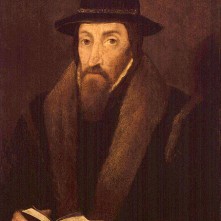
John Foxe
1536 – Eustace Chapuys, Imperial Ambassador, was tricked into acknowledging Anne Boleyn as Queen. Chapuys had refused the offer of visiting Anne and kissing her hand, but George Boleyn conducted the ambassador to mass and manoeuvred him behind the door through which Anne would enter. As Anne entered with the King, she turned, stopped and bowed to Chapuys. He had no choice, and had to bow and recognise the woman he called “the concubine” as queen.
1540 – King Henry VIII made Thomas Cromwell Earl of Essex, just three months before he was executed after being found guilty of treason, heresy, corruption and more.
1552 – Death of John Leland, poet and antiquary, in the parish of St Michael le Querne, Cheapside, London. He was buried there. In 1547, Leland “fell besides his wits” and in 1551, his brother was granted custody of him and his possessions. Leland is known for the notebooks of his travels around England and Wales, which were published as “The Itinerary of John Leland the Antiquary” by Thomas Hearne.
1555 – Death of Polydore Virgil, Italian humanist scholar and historian, at Urbino. He was buried in the Chapel of St Andrew in the Duomo in Urbino. Virgil has been called the “Father of English History”, and his famous works include De inventoribus rerum and the Anglica Historia.
1556 – Death of Sir John Gage, military administrator and courtier, at his home, Firle Place, Sussex. He was buried at West Firle church. Gage's offices included Chancellor of the Duchy of Lancaster, Comptroller of the Household, Constable of the Tower and Lord Chamberlain.
1570 – Burial of William Herbert, 1st Earl of Pembroke, at St Paul's, beside his wife. He had died at Hampton Court Palace on 17th March.
1587 - John Foxe, the English historian, reformer and martyrologist, died aged around seventy. He is known for his book “Actes and Monuments”, commonly known as “Foxe’s Book of Martyrs”, an account of Christian martyrs throughout history, with particular emphasis on the Protestant martyrs who died during the reign of Mary I.
19 April
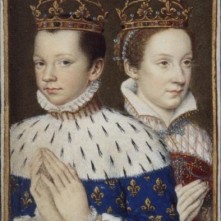
Mary Queen of Scots and Francis II
1558 – Mary, Queen of Scots and Francis, the Dauphin, were formally betrothed at the Louvre.
1568 – Funeral of Sir Ambrose Cave, Knight of the Hospital of St John of Jerusalem and administrator, at the Savoy Chapel. He was buried at Stanford, Northamptonshire. Sir Francis Knollys was his chief mourner.
1587 - Sir Francis Drake entered the harbour of Cadiz on the Spanish coast and led a pre-emptive strike on the Spanish fleet, destroying a number of ships (20-30) and their supplies, and causing the planned Spanish attack on England to be postponed for over a year. Drake referred to this successful attack as "Singeing the King of Spain's beard".
1601 – Hanging of James Duckett, bookseller and Catholic martyr, at Tyburn, after Roman Catholic books were found in his possession.
1608 – Sudden death of Thomas Sackville, 1st Baron Buckhurst and 1st Earl of Dorset, poet, member of Parliament and administrator, at Whitehall from a stroke suffered at the council table. Sackville's offices in Elizabeth I's reign included ambassador, Chancellor of the University of Oxford and Lord Treasurer. His literary works included the 1561 drama “Gorboduc”, written with Thomas Norton, the poem “Complaint of Henry, Duke of Buckingham” and the allegorical poem “Induction”.
1615 – Death of Laurence Bodley, Church of England clergyman and brother of Thomas Bodley, founder of the Bodleian Library. He died at the age of sixty-seven and was buried in Exeter Cathedral.
20 April
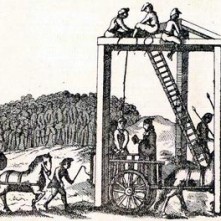
The Tyburn Tree (gallows)
1483 – Burial of Edward IV in St George's Chapel, Windsor Castle.
1523 – Death of Henry Clifford, 10th Baron Clifford, magnate. At around the age of sixty, Clifford led a force at the Battle of Flodden in 1513 against the Scots.
1534 – Prominent citizens of London were required to swear the “Oath of the Act of Succession”.
1534 - Elizabeth Barton, known as “the Nun of Kent” or “the Holy Maid of Kent”, was hanged at Tyburn with her spiritual adviser, Father Edward Bocking; Richard Risby, Warden of the Observant Friary at Canterbury; and Hugh Rich, Warden of the Observant Friary at Richmond. See Elizabeth Barton, the Nun of Kent for more information.
1578 – Death of Lady Mary Keys (née Grey), sister of Lady Jane Grey and wife of Thomas Keys, Sergeant Porter to Elizabeth I. Mary married Keys in secret in 1565, angering Elizabeth I. As a result, Keys was thrown into Fleet Prison and Mary was put into the care of Sir William Hawtrey at Chequers. Mary was later moved to the home of Katherine Willoughby, Duchess of Suffolk and her stepgrandmother, and then on to that of Sir Thomas Gresham. In 1568, Keys was released from prison, but he died in 1571 without ever being reconciled with Mary. Mary stayed with Gresham, voluntarily because she had nowhere else to go, until moving to her stepfather's house in 1573 and setting up her own home in London. She died at her home in London.
1584 – Execution of sixty year-old James Bell, Catholic priest and martyr, at Lancaster. Bell had been found guilty of being a Catholic recusant and celebrating the mass, and sentenced to death for high treason.
1587 - Burial of John Foxe, martyrologist, in St Giles, Cripplegate. He died 18th April at his home in Grub Street, in the same parish.
21 April
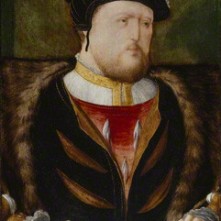
Henry VIII
1509 - Death of Henry VII at Richmond Palace. He had known that he was dying for some time, and had retired to Richmond at the end of February to spend his last days there. He passed the throne on to his second son Henry, who became Henry VIII. Click here to read more about this day in history.
1566 (20th or 21st) – Death of Sir John Mason, member of Parliament, diplomat in the reigns of four Tudor monarchs, Privy Councillor in Edward VI's reign and Treasurer of the Chamber in Elizabeth I's reign. He was buried in St Paul's Cathedral, in the north choir.
1566 – Death of Sir Richard Sackville, member of Parliament and administrator, in London. He served Henry VIII as Under-Treasurer of the Exchequer, Chancellor of the Court of Augmentations and Escheator of Surrey and Sussex, Edward VI as Custos Rotulorum of Sussex (a post held until his death) and Lord Lieutenant of Sussex, and Elizabeth I as Privy Councillor and Chancellor of the Exchequer. He was buried at Withyham in Sussex.
1580 – Death of philanthropist William Lambe. He was buried at St Faith under St Paul's. Lambe was a Gentleman of the Royal Chapel in Henry VIII's reign, but is known for his philanthropy in Elizabeth I's reign. For example, he funded the building of almshouses and a grammar school in Sutton Valance, Kent, also the building of Holborn conduit.
1581 – Burial of Thomas Charnock, alchemist, at Otterhampton in Somerset after dying at his home in Combwich. In his “Booke dedicated vnto the queenes maiestie” he offered Elizabeth I the health and wealth that the philosopher's stone could bring if she would finance his work.
22 April
1520 – Death of Sir John Ernley, lawyer and Attorney-General in the reigns of Henry VII and Henry VIII. He was made Chief Justice of the Common Pleas in January 1519, and was knighted that year. He was buried at Sidlesham, near Chichester.
1542 – Death of Henry Clifford, 1st Earl of Cumberland. He supported Henry VIII during the Pilgrimage of Grace, when he was Warden of the West Marches, by leading a force in Northumberland. His reward for his loyalty was to be elected to the Order of the Garter in 1537. Cumberland was buried at Skipton Parish Church.
1598 – Death of Francis Beaumont, member of Parliament, Serjeant-at-Law and Justice of the Common Pleas in the reign of Elizabeth I. He died from gaol fever at his home in Grace Dieu, Leicestershire and was buried in Belton Church. His colleague Serjeant Drew also died of the fever, which they picked up on the Lent circuit in Lancaster.
23 April
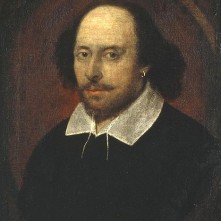
William Shakespeare
1500 – Birth of Alexander Ales (Alesius, Aless), Scottish theologian and reformer, at Edinburgh. His mother was Christina Bigholm, and his actual surname seems to have been Alan or Allane. He changed his name when he went into exile, choosing “Alesius”, meaning “bird”, or in this case, “exile”.
1512 – Birth of Henry Fitzalan, 12th Earl of Arundel, son of William Fitzalan, 11th Earl of Arundel, and Anne (née Percy), daughter of Henry Percy, 4th Earl of Northumberland. At his baptism, Henry VIII stood as his godfather. He served Henry VIII as Deputy of Calais, Privy Councillor and Lord Chamberlain.
1536 – Sir Nicholas Carew was elected to the Order of the Garter at the annual chapter meeting at Greenwich, rather than George Boleyn, brother of Queen Anne Boleyn.
1564 - Traditional birthdate of William Shakespeare, the Bard. It is not known on what date Shakespeare was actually born but he was baptised at Stratford-upon-Avon on 26th April 1564, and baptism usually took place around three days after birth.
William Shakespeare also died on this day in 1616. He was buried at the Holy Trinity Church, Stratford-upon-Avon, in the chancel. See www.elizabethfiles.com/william-shakespeare/3816/ for a bio of Shakespeare.


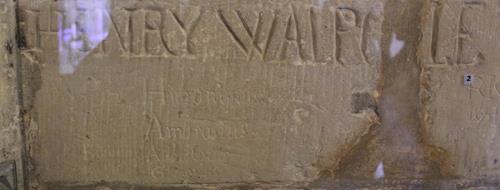
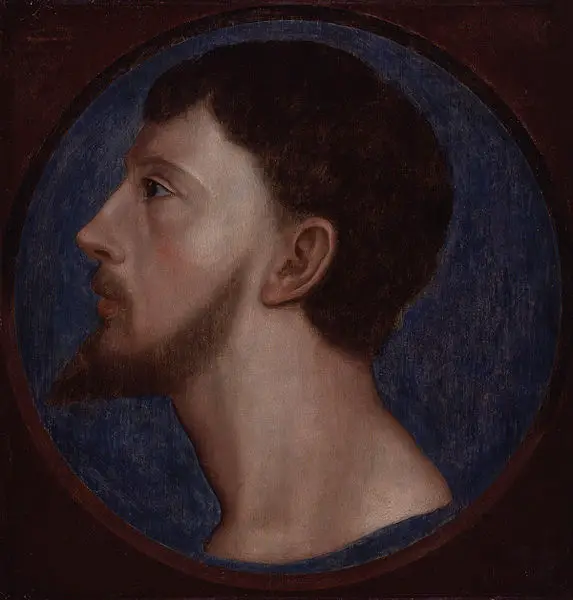
Leave a Reply